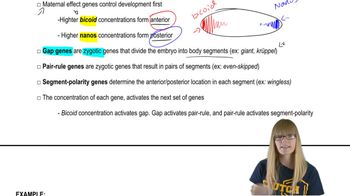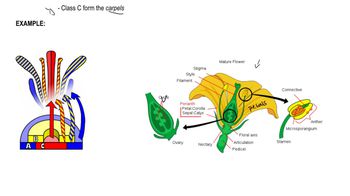Table of contents
- 1. Introduction to Genetics51m
- 2. Mendel's Laws of Inheritance3h 37m
- 3. Extensions to Mendelian Inheritance2h 41m
- 4. Genetic Mapping and Linkage2h 28m
- 5. Genetics of Bacteria and Viruses1h 21m
- 6. Chromosomal Variation1h 48m
- 7. DNA and Chromosome Structure56m
- 8. DNA Replication1h 10m
- 9. Mitosis and Meiosis1h 34m
- 10. Transcription1h 0m
- 11. Translation58m
- 12. Gene Regulation in Prokaryotes1h 19m
- 13. Gene Regulation in Eukaryotes44m
- 14. Genetic Control of Development44m
- 15. Genomes and Genomics1h 50m
- 16. Transposable Elements47m
- 17. Mutation, Repair, and Recombination1h 6m
- 18. Molecular Genetic Tools19m
- 19. Cancer Genetics29m
- 20. Quantitative Genetics1h 26m
- 21. Population Genetics50m
- 22. Evolutionary Genetics29m
14. Genetic Control of Development
Developmental Patterning Genes
Problem 16a
Textbook Question
Textbook QuestionThe pair-rule gene fushi tarazu is expressed in the seven even-numbered parasegments during Drosophila embryogenesis. In contrast, the segment polarity gene engrailed is expressed in the anterior part of each of the 14 parasegments. Since both genes are active at similar times and places during development, it is possible that the expression of one gene is required for the expression of the other. This can be tested by examining expression of the genes in a mutant background—for example, looking at fushi tarazu expression in an engrailed mutant background, and vice versa. Given the hierarchy of gene action during Drosophila embryogenesis, what might you predict to be the result of these experiments?
 Verified Solution
Verified SolutionThis video solution was recommended by our tutors as helpful for the problem above
Video duration:
2mPlay a video:
284
views
Was this helpful?
Video transcript
Related Videos
Related Practice

